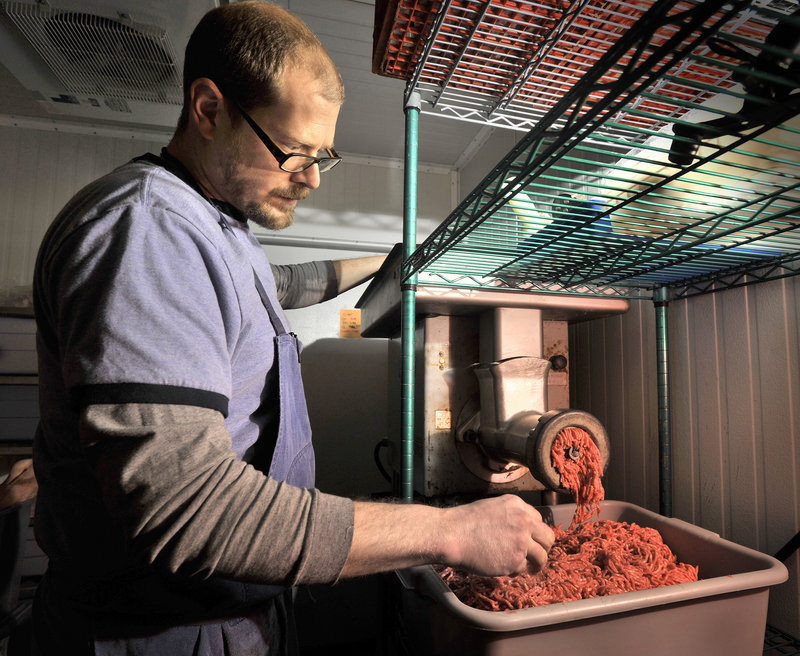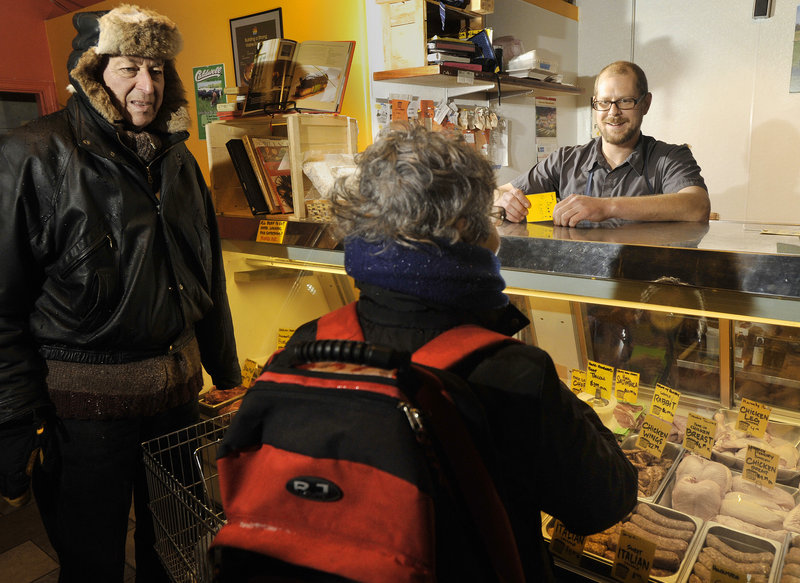Jutta Graf of Portland prefers buying meat from her neighborhood butcher, Jarrod Spangler at Rosemont Market, rather than at a large grocery store.
There are lots of reasons. Graf likes the way Spangler cuts meat and that he renders his own lard. She and her husband enjoy trying the different sausages Spangler makes right in the store, and were recently delighted to find an air-cured beef known as bresaola that they had eaten in Italy.
And Graf also doesn’t like the idea of putting meat from a factory farm into her body.
A growing number of consumers like Graf are buying their meat from neighborhood butchers who work with locally raised animals, rejecting the idea of pre-cut, pre-packaged meats shipped from large, anonymous farms hundreds or thousands of miles away.
The Hannaford ground beef recall, and federal investigators’ failure to find the source of the salmonella contamination, has prompted some local butchers to change their meat grinding practices and encouraged a “buy local” attitude among shoppers like Graf.
Graf said she likes Hannaford, but the salmonella contamination and recall didn’t really surprise her.
“They could not identify it because when you have scraps they make the hamburger meat out of it, and so they didn’t really know where all the meat had come from,” she said. “Whereas if you have a small butcher like this, they know exactly where everything is coming from, and God forbid there would ever be anything, it could be identified immediately.”
Buying local doesn’t guarantee that the meat is free from harmful microbes that can make you desperately ill. Safe food handling practices are still necessary.
But local butchers say they are more accountable to their customers, and if there were an outbreak, it would be easier to trace.
“When you come into our shop, we can tell you exactly where each piece of meat comes from,” said Ben Slayton, one of the owners of Farmers’ Gate Market, a butcher shop in Wales that sells meat from a network of about 20 pasture-based Maine farms. He slaughters his own poultry and processes red meat at nearby Bisson & Sons in Topsham.
When a cow comes in destined for Farmers’ Gate, Bisson & Sons slaughters it, logs it into their books and a state inspector gives the meat a stamp of approval. The animal arrives in quarters at Farmers’ Gate, where a voluntary tracking system takes over. A logbook tracks the weight of the meat and the lot number, an internal number that tracks the specific animal.
By the time the meat is broken down and reaches the consumer, the butchers can still trace it back to the day the meat was cut and the individual farm that produced it, but not to the individual animal. But the amount of meat the business processes is so small — two or three animals every other week — it wouldn’t be tough to at least narrow it down.
Farmers’ Gate has always kept detailed grind logs for its sausage, but since the Hannaford recall the owners have decided to start doing the same for ground beef.
“It’s easy for us to sit back and say, ‘Look at Hannaford, they’re getting their beef from who knows where and aggregating it, and no wonder this happened to them,’ ” Slayton said. “That’s the knee-jerk reaction — but the other response we could have is ‘Gee, this stuff can happen to us, and what can we do to try to prevent it?’ “
Food safety is not the only thing luring customers back to local butchers. Some customers, for environmental reasons, don’t want food that has traveled a long distance, or they want to know the animal was treated well while it was alive and was slaughtered humanely.
And then there’s taste and selection.
At Rosemont Market on Brighton Avenue, alongside the usual cuts of beef, you’ll find pork belly, housemade sujuk (a spicy Turkish sausage), lamb necks and housemade smoked kielbasa.
Spangler hand-butchers and hand-grinds whole, locally raised goats, lambs, pigs, rabbits, chickens, geese and ducks from local farms such as Mainely Poultry in Warren, Caldwell Family Farm in Turner, Valley View Farm in Auburn and Crystal Spring Farm in Brunswick.
Every week Spangler breaks down a cow, two lambs and two or three pigs.
Quality local products come at a premium price. A pound of ground beef from Caldwell Farm costs $5.99 at Rosemont. At Hannaford, ground beef ranges from $1.99 to $4.89 a pound for Angus ground beef.
“The system has been set up over the last 50 to 60 years to remove the customer from the source of their meat — from all of their food, in a lot of ways,” Slayton said. “And that allows for efficiencies and economies of scale to take over, and therefore costs come down. Our case is that if you need to look for a deal, you’re better off looking for a deal on an automobile. You shouldn’t take those kind of chances on the food you eat.”
Graf said she and her husband have sacrificed quantity for quality.
“We tend to eat less meat, period, the last few years,” she said. “But I have quality. I have something absolutely delicious.”
Buying local is also about making a connection between the customer and the butcher, Spangler said.
“Those are the kinds of interactions I think customers appreciate more than just going to the supermarket and looking at a Styrofoam tray wrapped in plastic wrap,” he said. “There’s very few people who are just willing to walk up to the butcher counter and ask them to custom cut things. Most people will walk through the prepackaged stuff because they don’t want to talk to anybody.”
For the butcher, buying local takes away anonymity.
“You’re going to take good care when you know the people you’re taking care of,” Slayton said. “It’s easier to slip by a little bit when you’re handling meat that is going to go somewhere, you don’t know where, to someone you don’t know at all.”
“It doesn’t happen like that when you look people square in the eye, and you’re the one who cut the meat and put it through the grinder and packaged it and handed it to them. It’s why we want more smaller scale local food systems, because that accountability is built right into it.”
Staff Writer Meredith Goad can be contacted at 791-6332 or at:
mgoad@pressherald.com
Twitter: MeredithGoad
Send questions/comments to the editors.





Success. Please wait for the page to reload. If the page does not reload within 5 seconds, please refresh the page.
Enter your email and password to access comments.
Hi, to comment on stories you must . This profile is in addition to your subscription and website login.
Already have a commenting profile? .
Invalid username/password.
Please check your email to confirm and complete your registration.
Only subscribers are eligible to post comments. Please subscribe or login first for digital access. Here’s why.
Use the form below to reset your password. When you've submitted your account email, we will send an email with a reset code.